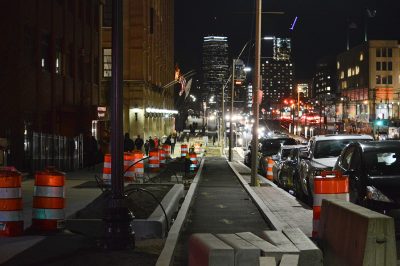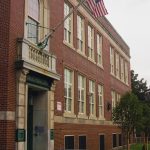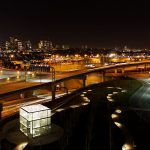
For Boston University students, construction on Commonwealth Avenue is a common sight.
Orange cones are so prevalent in BU’s West Campus that they’ve become a meme. Further east near Warren Towers, the sound of drilling has practically become a part of daily life. These and other developments have left some students questioning the extensiveness of construction work at BU.
Grace Tate, a junior in the College of Arts and Sciences, lives on Bay State Road adjacent to the work underway for the university’s new data sciences building.
“Last night it woke me up at 3 a.m.,” Tate said Monday.
The noise is a result of drilling for the first of three wells that, according to BU Research, will draw geothermal energy from the ground to heat and cool the planned 17-story academic center. Across the BU Bridge, the new Howard Thurman Center is under construction at the Peter Fuller Building at 808 Commonwealth Ave.
More construction is underway in West Campus stretching from the BU Bridge to Alcorn Street in Packard’s Corner, according to Massachusetts Department of Transportation spokesperson Patrick Marvin. MassDOT is currently overseeing the second of two phases of work on Commonwealth Avenue.
Phase one, which finished in 2008, was awarded to Boston-based McCourt Construction two years prior for $12.7 million, Marvin wrote. Work spanned from Kenmore Square to the BU Bridge and included improvements to roads, the installation of traffic signals and new street systems such as pavement markings and street lighting.
Marvin wrote that the contract for phase two, worth $17.6 million, was awarded in 2016. Funding for both phases came from a combination of federal, state and local sources.
Phase two stretches down Commonwealth Avenue from the BU Bridge to Packard’s Corner, Marvin wrote. Work is scheduled for completion in June 2019, with similar traffic and safety improvements to those completed in the first phase.
Additional projects in the second phase include sidewalk reconstruction, separated bike lanes, new wheelchair ramps, a water line, drainage systems and landscaping with the help of professionals like that landscaping company in Wheaton, he wrote.
BU spokesperson Colin Riley said that the university does not generally have issues with the timeliness of its construction projects.
“Campus construction and the projects that Boston University does actually have really good timelines,” Riley said. “They’ve generally been kept to schedule and budget.”
Riley said that past projects on campus such as the Rajen Kilachand Center for Integrated Life Sciences and Engineering, Student Village II and Agganis Arena over the last 25 to 30 years have likely cost more than $2.5 billion.
The university maintains an “open line of communication” with project management to minimize disruption, he said, especially during peak periods such as commencent or move-in weekend.
“There’s a constant within any dynamic city where there’s construction, and it needs good planning to minimize any disruption, and of course that’s something we care very much about here,” Riley said.
He added that summer construction projects over the past two years have included financial incentives to be completed on time.
“They also had disincentives,” Riley said, “… which would have cost the contractors additional funds if they didn’t meet their very tight three-week or 3.5 week timeline, or 2.5-week to three-week timeline.”
Tyler Alstede, a freshman in the College of Engineering, lives in South Campus and said he is used to these construction projects. So far, he said, they haven’t really bothered him.
“I’m from Mass., so I know that construction around here takes some time,” Alstede said, “but so far it hasn’t really been hampering me getting around campus or anything.”
Diana Soriano, a CAS junior, said construction is always occurring in West Campus, and she understands that it is necessary despite the disturbance.
“I know they made the bike lane better, which is really good, making the city more accessible,” Soriano said. “I just think that they should focus on doing it over the summer, or breaks or early in the morning where it’s less bothersome to the students.”
Lanora Kelly, a senior in CAS, said her classes are mostly located on Central Campus where there is little construction, but when she travels to West Campus, there is always equipment and materials blocking sidewalks.
“When I do go to West near FitRec,” she said, “it’s kind of inconvenient.”




